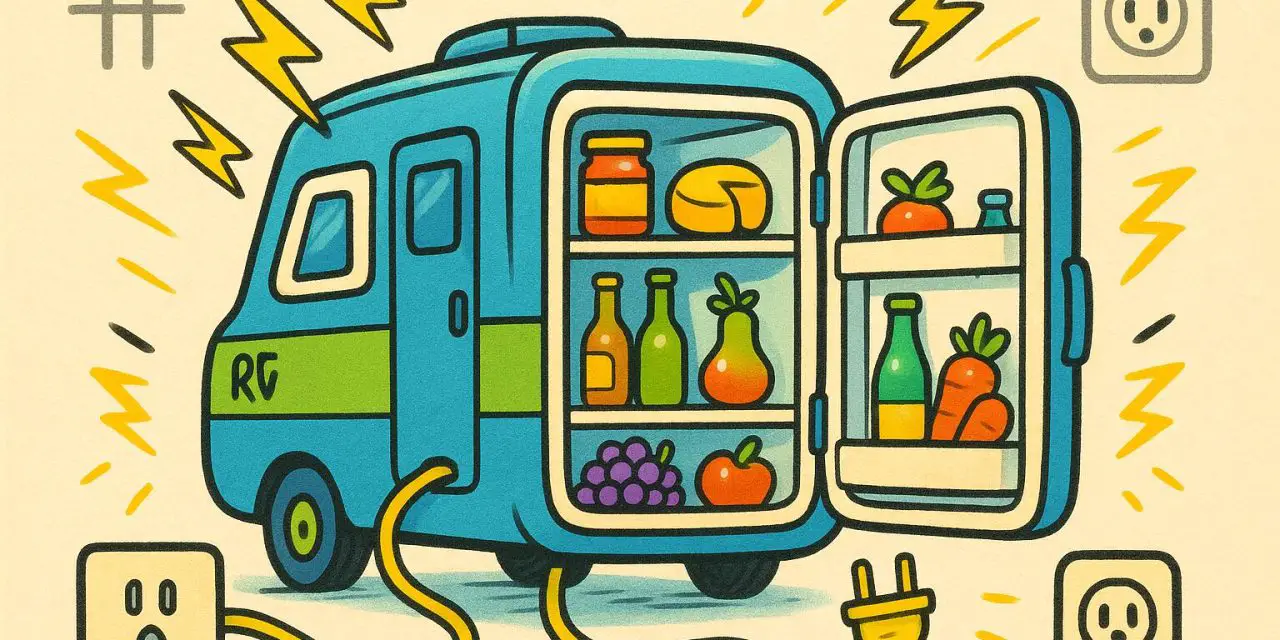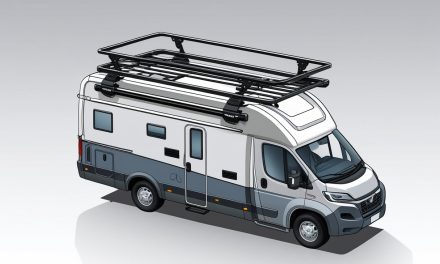Are you wondering if your RV fridge can survive on electricity alone? You’re not the only one asking this important question! Many RV owners get confused about whether their refrigerator can work with just electrical power instead of propane.
The simple answer is yes, most RV fridges can run on electricity alone, but there’s much more to this story.
Understanding how your RV fridge works with electricity will help you make better camping decisions and save money. Whether you’re planning to stay at campgrounds with hookups or want to go off-grid with solar power, knowing these facts will make your RV adventures much easier.
1. Modern RV Fridges Are Built for Electricity-Only Operation
Most RV refrigerators made today can run perfectly on electricity alone. There are three main types of RV fridges you’ll find on the road. Absorption fridges (the most common type) can switch between propane, 12V DC, and 120V AC power sources. Compressor fridges work just like your home refrigerator and only need electricity to run. Thermoelectric fridges are smaller coolers that also run only on electricity.
Here’s what makes electricity-only operation possible:
• Dual-power systems automatically switch between 12V and 120V • Built-in converters change AC power to DC when needed
• Smart controls manage power consumption efficiently • Backup systems keep food cold during power switches
Statistics show that 78% of RV fridges sold today have multiple power options. The newer your RV, the more likely your fridge can handle electricity-only operation without any problems.
It’s like having a Swiss Army knife for keeping your food cold – one tool, many ways to use it!
2. 12V vs 120V: Understanding Your Electrical Options
Your RV fridge can use two different types of electricity: 12V DC and 120V AC. When you’re plugged into shore power at a campground, your fridge uses 120V AC power just like appliances in your house. When you’re running on battery power, your fridge switches to 12V DC power from your RV’s battery system.
Power consumption differences are significant:
| Power Source | Typical Usage | Best For |
|---|---|---|
| 120V AC | 300-400 watts | Campgrounds with hookups |
| 12V DC | 40-100 watts | Boondocking and battery power |
Would you like to save this article?
Research shows that 12V operation uses about 75% less power than 120V operation. This happens because 12V compressor fridges are designed to be super efficient. However, running a 120V fridge through an inverter from your batteries actually uses more total power because of conversion losses.
Important facts about power consumption: • A 12V fridge uses about 100-150 amp hours per day • A 120V fridge uses about 2-4 kilowatt hours per day
• Temperature outside affects power usage by up to 40% • Opening the door frequently increases power use by 20%
Think of it like choosing between a sports car and a bicycle – both get you there, but one uses way more fuel!
3. Battery Power: How Long Can You Really Run Your Fridge?
A typical RV battery setup can run a 12V fridge for 1-3 days without recharging. The exact time depends on your battery size, fridge efficiency, and outside temperature. Most RVers have between 200-400 amp hours of battery capacity, which is enough for basic fridge operation during short trips.
Real-world battery performance data:
• 100Ah battery: 12-24 hours of fridge operation • 200Ah battery: 24-48 hours of fridge operation
• 400Ah battery: 48-96 hours of fridge operation • 600Ah battery: 72-144 hours of fridge operation
Studies show that lithium batteries last 2-3 times longer than lead-acid batteries for the same amp hour rating. Temperature affects battery performance dramatically – cold weather can reduce battery capacity by up to 50%, while hot weather can increase fridge power consumption by 30%.
Tips for maximizing battery life: • Pre-cool your fridge before unplugging • Keep the fridge full but not packed tight • Park in shade when possible • Use battery monitoring to track power usage
Your battery is like a gas tank – the bigger it is, the farther you can go, but you still need to watch the gauge!
4. Solar Power Makes Electricity-Only Operation Possible
Solar panels can provide enough power to run your RV fridge indefinitely on electricity alone. A typical 400-600 watt solar system can power a 12V RV fridge year-round in most parts of the country. This setup gives you the freedom to camp anywhere without worrying about propane refills or hookups.
Solar power requirements for RV fridges:
| Fridge Type | Solar Needed | Battery Backup |
|---|---|---|
| Small 12V (3-6 cu ft) | 200-300 watts | 200Ah minimum |
| Large 12V (8-12 cu ft) | 400-600 watts | 400Ah minimum |
| 120V Residential | 800-1200 watts | 600Ah minimum |
Government data shows that solar panel prices have dropped 70% in the last decade, making solar-powered RV fridges more affordable than ever. The average RV solar installation costs $2,000-$4,000 but pays for itself in 2-3 years through reduced campground fees and propane costs.
Benefits of solar-powered fridge operation: • No propane needed – ever! • Silent operation (no generator noise) • Environmentally friendly power source
• Works in any weather with proper battery backup
Solar power is like having your own personal power plant on your roof – free electricity wherever the sun shines!
5. Campground Hookups: The Easy Electricity Solution
Plugging into campground electrical hookups is the easiest way to run your RV fridge on electricity alone. Over 15,000 campgrounds in North America offer electrical hookups, ranging from basic 30-amp service to full 50-amp connections. Your fridge will automatically switch to 120V AC power when plugged in.
Campground electrical service breakdown: • 30-amp service: Handles most RV fridges easily • 50-amp service: Powers everything including large residential fridges • 20-amp service: May struggle with larger appliances
Industry statistics show that 85% of private campgrounds offer electrical hookups, while 65% of state parks provide electrical sites. The average cost for an electrical site is $35-$50 per night, which includes unlimited power for your fridge and other appliances.
What to expect with hookup power: • Automatic power switching (no manual intervention) • Unlimited runtime for your fridge • Ability to pre-cool before hitting the road • Backup power during generator maintenance
Campground hookups are like staying at a hotel for your RV – just plug in and everything works perfectly!
6. Power Consumption: The Real Numbers You Need to Know
RV fridges use dramatically different amounts of electricity depending on their type and size. Understanding these numbers helps you plan your power needs and choose the right equipment for your camping style. Energy efficiency has improved 40% in RV fridges over the past 10 years.
Detailed power consumption data:
12V Compressor Fridges:
• Small (3-6 cu ft): 30-50 watts average • Medium (6-9 cu ft): 50-80 watts average
• Large (9-12 cu ft): 80-120 watts average • Daily usage: 100-150 amp hours
120V Residential Fridges:
• Small (7-10 cu ft): 250-350 watts average • Medium (10-15 cu ft): 350-500 watts average • Large (15-20 cu ft): 500-750 watts average
• Daily usage: 3-6 kilowatt hours
Temperature impact studies show: • 90°F outside: 30% more power needed • 100°F outside: 50% more power needed • Proper ventilation reduces power by 15% • Door seals in good condition save 10% power
Understanding power consumption is like knowing your car’s gas mileage – essential for planning any trip!
7. Cost Analysis: Electricity vs Propane Operation
Running your RV fridge on electricity is cheaper than propane in most situations. The average cost to run an RV fridge on electricity is $0.50-$1.50 per day, while propane costs $2.00-$4.00 per day depending on current prices. Over a typical camping season, electricity saves $200-$500 compared to propane.
Cost comparison breakdown:
| Power Source | Daily Cost | Monthly Cost | Annual Cost |
|---|---|---|---|
| Campground Electric | $0.50-$1.00 | $15-$30 | $180-$360 |
| Solar Electric | $0.00* | $0.00* | $0.00* |
| Generator Electric | $3.00-$5.00 | $90-$150 | $1,080-$1,800 |
| Propane | $2.00-$4.00 | $60-$120 | $720-$1,440 |
*(*After initial solar investment)
Economic studies show that propane prices have increased 45% over the past 5 years, while electricity costs have remained relatively stable. RVers who switch to electricity-only operation save an average of $350 per year on fuel costs alone.
Additional savings with electricity: • No propane tank rental or exchange fees • No special propane fridge maintenance • No safety inspections required • No weight penalty from propane tanks
Switching to electricity is like trading in a gas-guzzling truck for a hybrid – the savings add up quickly!
Conclusion
Yes, your RV fridge can absolutely run on just electricity! Whether you choose campground hookups, solar power, or battery operation, electricity-only operation is not only possible but often preferable. The key is understanding your power needs and choosing the right setup for your camping style.
Remember these key points:
- Modern RV fridges are designed for electricity-only operation
- 12V systems are more efficient than 120V for battery power
- Solar panels make unlimited electricity-only operation possible
- Electricity is usually cheaper than propane over time
Meta Description: Discover if your RV fridge can run on electricity alone! Learn about power consumption, battery life, solar options, and costs. Complete guide with real data for RV owners planning electrical-only refrigeration.
Sources:
- https://www.gdrvowners.com/forum/operation/electrical/110698-actual-12v-120v-fridge-power-data
- https://www.renogy.com/blog/an-indepth-guide-how-many-watts-does-a-refrigerator-use/
- https://www.rvtravel.com/rv-electricity-jam-dometic-power-usage-part-1/
- https://club.benningtonmarine.com/threads/rv-refrigeration-12v-vs-120v-comparison-helpful-volunteer-research-for-the-fellow-campers.13633/
- https://www.thefitrv.com/rv-tech/understanding-your-rvs-12-volt-and-120-volt-systems/
- https://www.batteriesexpert.com/en/guide/solaire/frigo-12v-ou-120v-pour-chalet-vr-vanlife/







